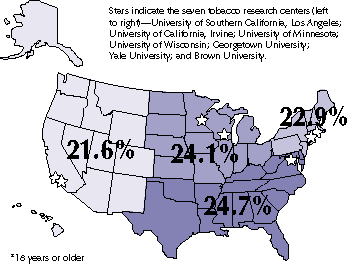 Percentages of Adults* Who Smoke Cigarettes. Although the prevalence of adult cigarette smokers is high, the numbers reflect only one piece of the problem. NIDA's new research centers will seek ways to combat all types of tobacco use among all population segments, adults and children alike. Statistics from Centers for Disease Control and Prevention in Atlanta.
Percentages of Adults* Who Smoke Cigarettes. Although the prevalence of adult cigarette smokers is high, the numbers reflect only one piece of the problem. NIDA's new research centers will seek ways to combat all types of tobacco use among all population segments, adults and children alike. Statistics from Centers for Disease Control and Prevention in Atlanta.NIDA, the National Cancer Institute (NCI), and The Robert Wood Johnson Foundation (RWJF) have awarded grants to seven academic research institutions to establish Transdisciplinary Tobacco Use Research Centers (TTURCs) devoted to investigating new ways to combat tobacco use and nicotine addiction. The institutions will receive $70 million from NIDA and NCI for the project. RWJF will provide an additional $14 million over 5 years to support improved communications and policy development at the TTURCs.
In the past, research grants typically have focused on single components of tobacco use and nicotine addiction, treatment, or prevention, notes Dr. Jaylan Turkkan, chief of NIDA's Behavioral Sciences Research Branch and coordinator of NIDA's TTURC efforts. "The transdisciplinary approach will bring together collaborators who will have the freedom to investigate wider aspects of nicotine addiction, such as factors that influence smoking initiation, and to study the issues at levels ranging from genetics to peer interactions," Dr. Turkkan says.
"The transdisciplinary centers represent an important new approach to research," says NIDA Director Dr. Alan I. Leshner. "Tobacco use and nicotine addiction are incredibly complex subjects, and transdisciplinary investigation can give us the broad perspective we need to understand the etiology of this addiction. This approach will lead to the development of new interventions that will help prevent tobacco use, particularly among teens and younger children."
The TTURC concept evolved from informal conversations among researchers and policymakers at a July 1998 conference - "Addicted to Nicotine" - cosponsored by NIDA, RWJF, NCI, and the Centers for Disease Control and Prevention. Several months later, NCI's Tobacco Research Implementation Group recommended transdisciplinary centers as its highest tobacco use research priority. Within a year, NIDA and NCI jointly issued a Request for Applications from academic centers interested in developing such centers. The first TTURC awards were announced in October 1999. The centers, principal investigators, and research areas are:
- Brown University Center for Behavioral and Preventive Medicine at the Miriam Hospital, Providence, Rhode Island; Principal Investigator Dr. David Abrams; Research Area Identification of early childhood and lifetime psychiatric factors that determine smoking initiation, dependence, use patterns, cessation, and response to cessation treatment.
- University of California, Irvine; Principal Investigator Dr. Frances Leslie; Research Area Identification of predictors of nicotine addiction in animals and tobacco susceptibility and use in humans;
- University of Southern California, Los Angeles; Principal Investigator Dr. C. Anderson Johnson; Research Area Preventing tobacco use among youth of diverse cultures.
- Georgetown University, Washington, D.C.; Principal Investigator Dr. Caryn Lerman; Research Area Identification of biobehavioral basis of smoking initiation, smoking treatment, and harm from tobacco exposure.
- University of Minnesota, Minneapolis; Principal Investigator Dr. Dorothy Hatsukami; Research Area Treating smokers who have been resistant to conventional methods of intervention or who have not been previously targeted.
- University of Wisconsin Medical School, Madison; Principal Investigator Dr. Michael Fiore; Research Area Relapse to tobacco use.
- Yale University, New Haven, Connecticut; Principal Investigator; Dr. Stephanie O'Malley; Research Area Treatment of tobacco addiction.
